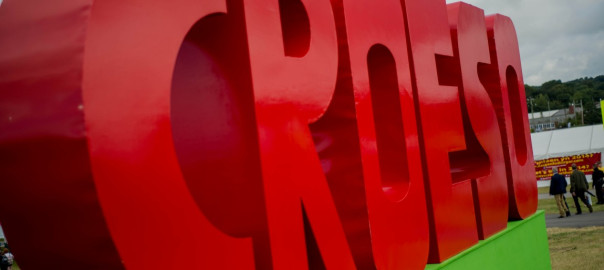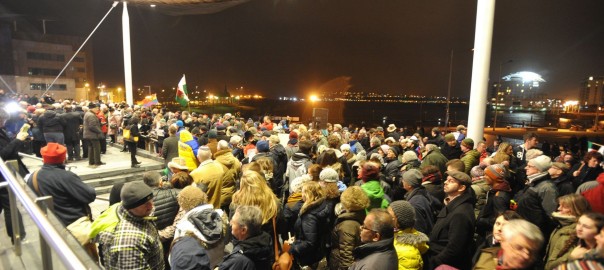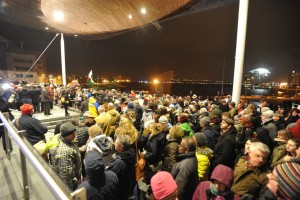Media in Wales – A Democratic Necessity
Lee Waters and Angela Graham introduce the first part of the IWA Wales Media Audit.
This post first appeared on the IWA clickonwales site October 13th 2015
Media in Wales – A Democratic Necessity
Lee Waters and Angela Graham introduce the first part of the IWA Wales Media Audit.
This post first appeared on the IWA clickonwales site October 13th 2015
British, Bold, Creative: a catchy, punchy title for the BBC’s statement of its plans for the next decade and beyond but, read from the point of view of the Welsh bit of ‘British’, the contents are something of a curate’s egg.
One sees the effort to engage with the Nations and Regions. There are suggestions about reconfiguring the delivery of news and about opening up platforms for a wider sharing of materials. The aspirations are right, as in section 7.3 Entertaining the whole UK:
Firstly, we will improve how we portray and represent the different Nations of the UK on our pan-UK network services. Secondly, we will strengthen the services for each Nation.
Then comes a very big ‘but’:
But significant new investment in a broader range of programming, such as drama, comedy and entertainment, cannot be delivered within the current Budget agreement with the Government… funding these ambitions would require additional income. Continue reading British, Bold, Creative – for all of us in Wales?
The Welsh Government’s decision to go for broke by demanding an extra £30m from the BBC licence for broadcasting in Wales, is a matter for both relief and rejoicing. In the last decade it has been strangely reluctant to take up the issue of service deficiencies in Wales. In the face of the decline of the ITV service, unending cuts at BBC Wales and reductions in S4C funding it has been tepid in its responses to calls for action by both the Institute of Welsh Affairs and the National Assembly’s own committees. Continue reading Broadcasting for the Nations

“as slow to be set on fire as a stomach”
I wondered, while listening to Rhodri Talfan Davies speak this week on two occasions at the National Eisteddfod, if some version of that sentiment ever entered his mind. It certainly entered mine. It’s a striking phrase coined by George Eliot to express her frustration at her contemporaries’ failure to grasp the spirit of the times. How slow we are – those of us not touched by genius such as hers ̶ to see the writing on the cultural wall in front of us. A new dispensation is coming and we need the ideas to meet it.
Continue reading Beyond Rhetoric – IWA Media Policy for Wales
I don’t know if anyone ever addresses Lord Hall of Birkenhead, Director General of the BBC, as ‘butt’. I suppose I’m unlikely to find out as he probably has more pressing questions to answer in these days of Charter Renewal debate. Nonetheless the question came to me as I reflected on a blog I wrote yesterday attempting to unpack what Tony Hall meant when he used the word ‘culture’ in a speech in Cardiff in 2014.
there are some aspects of national life in Wales that are not sufficiently captured by the BBC’s own television services in Wales, and I would include comedy, entertainment and culture in those categories
Tony Hall
I don’t want to treat that speech as some gospel to be mined for esoteric meanings and yet light did dawn, and the clue was an in example of one of the genres whose erosion he lamented in that text. He named comedy, entertainment and culture as genres whose production has been eroded, in the last decade, on English language television in Wales. I found myself thinking about a comedy series which, in my view, is one of the best BBC Wales has ever made. Continue reading Scampi and the Meaning of Life – TV and Culture in Wales

If a thing is repeated often enough it begins to be as persuasive as though it were true.
We’ve never had it so good, apparently. We live in a televisual Age of Plenty with digital wares piled high in the marketplace and so it’s time for the BBC to withdraw from universality and to stop disadvantaging the commercial sector by its scale and success; the level of public funding gives the BBC an unfair advantage over its competitors and the BBC should become more ‘distinctive’, confining itself to things the market can’t or won’t provide.

We all remember Leveson. And we still hear late rumblings from that consideration of corruption in the UK press as well as continuing debate as to how best to deal with it. A need for regulation was generally acknowledged but what system should be used? The compromise reached was the creation of self-regulators overseen by a Recognition Panel established by Royal Charter and the Panel came to Cardiff on 14th July.
The Press Recognition Panel held a consultative session in the School of Journalism, Cardiff on the criteria to be used when assessing applicants for recognition. This consultation process ends on 31st July. Continue reading Regulating the Regulators – the Press Recognition Panel and Wales
This blog appeared on 10th July 2015 on the IWA’s clickonwales blog site.
For the second time in five years Government Ministers have backed the BBC into a corner, issued a ‘money or your life’ threat, walked away with a big chunk of the licence fee and left a Director General making as good a public fist of defending ‘the deal’ as he can. Has this been a fair trade between a willing buyer and a willing seller? Continue reading BBC licence fee raid ̶̶ The consequences for Wales

On New Year’s Day this year the Western Mail published an article by the Secretary General of the Muslim Council of Wales, Saleem Kidwai. He claimed that a precious achievement in Welsh cultural life is in jeopardy and that a generation have felt ‘rejected by their fellow Welshmen’.
Welsh-Muslim youth who thought themselves like any other Welsh person got a rude awakening post-9/11 — a sort of cultural shock that they were not like any other Welsh person. Overnight, they were the other, the enemy…
As Mr Kidwai set out the traumatic ramifications of this tragic dissociation I felt the force of his appeal that, “As a society… We have to reject any attempts to marginalize Muslims as second-class citizens” but I was perplexed as to how to go about that.
Until I perceived a potential response from the world of journalism itself – from journalism in Wales.

In the hour-long class I gave to Michigan State University students we had to use a large teaching room in order to have space to dance. On the back wall are four posters which I designed last year for the teaching I did on the Documentary Pathway which is an option on the M.A. in International Journalism at Cardiff University. I stopped teaching on this course last year but the posters are still there so I took advantage of them briefly. The posters were an experiment in displaying some basic principles of practice. I’d like to focus on one of them here. It’s from an interview given by the late great American documentarian, Albert Maysles (Salesman, Gimme Shelter, Grey Gardens et al).
He addresses something which documentary-makers do not, in my experience, speak about often or readily. Maybe this is merely symptomatic of the fact that I’m of a generation that learned on the job and that revered good practice but talked little about theory. (Perhaps I’ll get a chance to explore that in the upcoming Wales Documentary Day, of which more in another post.)
Maysles talks about the gaze. Continue reading Documentary practice – a secret room of golden light